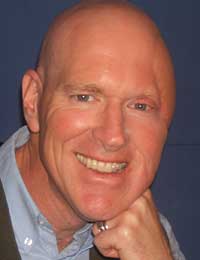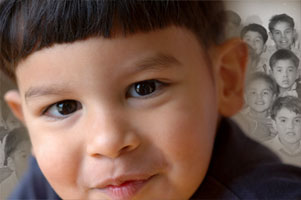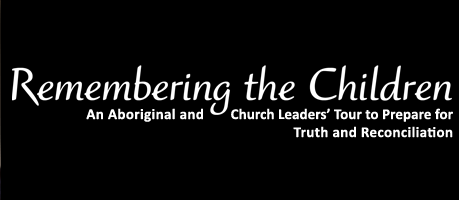Moved by suffering, moved by hopefulness
United Church of Canada Moderator, the Right Rev. David Giuliano, reflects on the first leg of the Remembering the Children tour
I chatted with a young couple across the aisle while folks around us were settling in on the flight to Ottawa. “Rick” had just won silver and bronze medals at the Paralympics in London, Ontario. His sport is Bocce Ball, but he has decided to forgo the Olympics in China, in part because of is concern over human rights and environmental issues.
Rick and his fiancée are grad students. They were marking “Introduction to Religious Studies” essays. The assignment had been to “visit a religious culture other than your own”. There were questions to answer about that experience. What a great assignment – entering with curiosity and openness into the religious practices of another culture. If only our ancestors had arrived on this continent with the same sort of humility and curiosity.
In the window seat beside me was an Inuit woman. She was on her way to Ottawa and then on to Iqaluit. She asked about my trip to Ottawa. I told her that I was travelling with other Church Leaders hoping to generate interest in the upcoming Truth and Reconciliation Commission. I asked her if members of her family had attended Residential Schools. “Yes,” she replied, “My father and father-in-law were taken to Churchill.” They were from Resolute Bay and Bathurst Inlet. It seemed too invasive to ask, but I wondered how her life had been shaped by the dislocation from family and community suffered by her father and father-in-law.
We landed in Ottawa and within hours the sound of a traditional drum thundered in Grand Hall of the Museum of Civilization in Gatineau. Traditional dancers led us into the hall. The procession included National Chief Phil Fontaine, George Erasmus and other First Nations leaders. There were leaders from Roman Catholic, Presbyterian, Anglican and United Churches. Hon. Chuck Strahl, Minister of Indian Affairs, and other politicians entered with us. There were 500 Aboriginal and non-Aboriginal participants in the ceremony.
As we walked into the hall, I found myself moved to tears by the drum and the dancers. Moved by the enduring suffering of the Residential Schools legacy we have come to acknowledge. Moved by the inexplicable hopefulness that rises up in that acknowledgment.

I chatted with a young couple across the aisle while folks around us were settling in on the flight to Ottawa. “Rick” had just won silver and bronze medals at the Paralympics in London, Ontario. His sport is Bocce Ball, but he has decided to forgo the Olympics in China, in part because of is concern over human rights and environmental issues.
Rick and his fiancée are grad students. They were marking “Introduction to Religious Studies” essays. The assignment had been to “visit a religious culture other than your own”. There were questions to answer about that experience. What a great assignment – entering with curiosity and openness into the religious practices of another culture. If only our ancestors had arrived on this continent with the same sort of humility and curiosity.
In the window seat beside me was an Inuit woman. She was on her way to Ottawa and then on to Iqaluit. She asked about my trip to Ottawa. I told her that I was travelling with other Church Leaders hoping to generate interest in the upcoming Truth and Reconciliation Commission. I asked her if members of her family had attended Residential Schools. “Yes,” she replied, “My father and father-in-law were taken to Churchill.” They were from Resolute Bay and Bathurst Inlet. It seemed too invasive to ask, but I wondered how her life had been shaped by the dislocation from family and community suffered by her father and father-in-law.
We landed in Ottawa and within hours the sound of a traditional drum thundered in Grand Hall of the Museum of Civilization in Gatineau. Traditional dancers led us into the hall. The procession included National Chief Phil Fontaine, George Erasmus and other First Nations leaders. There were leaders from Roman Catholic, Presbyterian, Anglican and United Churches. Hon. Chuck Strahl, Minister of Indian Affairs, and other politicians entered with us. There were 500 Aboriginal and non-Aboriginal participants in the ceremony.
As we walked into the hall, I found myself moved to tears by the drum and the dancers. Moved by the enduring suffering of the Residential Schools legacy we have come to acknowledge. Moved by the inexplicable hopefulness that rises up in that acknowledgment.
More from the event
Posted at 2:32 PM -


1 Comments:
I felt underwhelmed by Right Rev. David Giuliano's "Reflection".
I hope future reflections will feature less episodic journalism (e.g., environmental views by "Rick"). More theological reflections about "the I/inexplicable", please! At this launch event, what did any of the speakers say that launched the United Church's Moderator to higher-deeper-wider experiences of the Creator-Christ-Spirit and of (global) Neighbour . . . ? And may wordless arts (such as drumming and dancing) lead us word-readers to encounter afresh God's living Word . . . ?
Post a Comment
<< Home